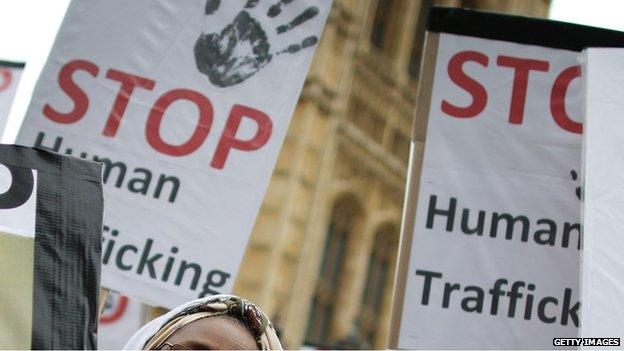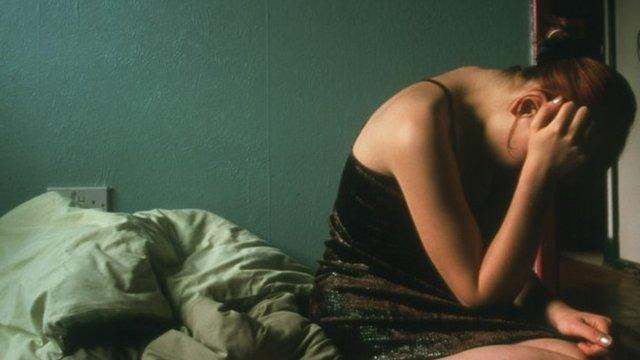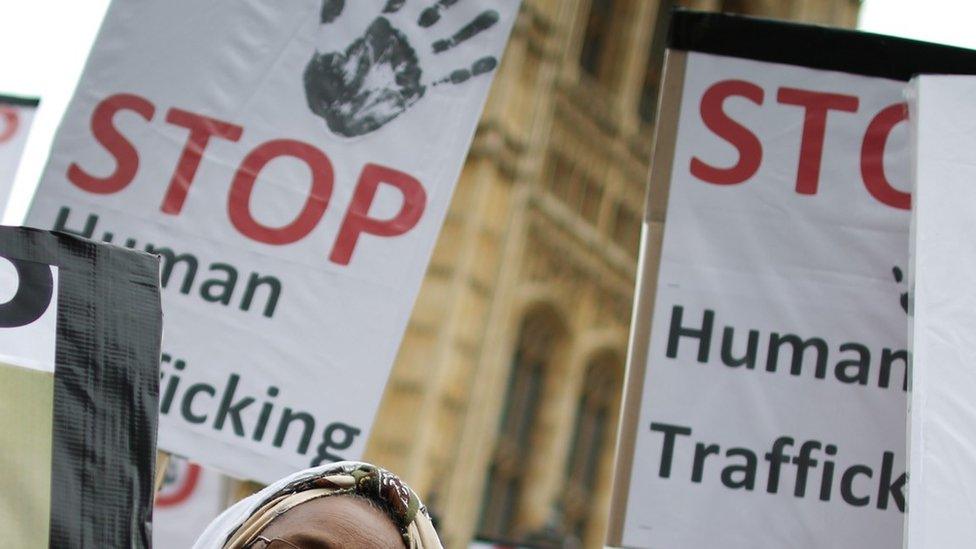Queen's Speech features new anti-slavery court powers
- Published

Courts in England and Wales are to get new powers to protect people who are trafficked into the UK, held against their will, and forced to work.
The new measures, which will ensure compensation is paid to victims, are contained in the Modern Slavery Bill, which was announced in the Queen's Speech on Wednesday.
The bill would change the maximum jail sentence from 14 years to life.
The Home Office wants the bill to become law before the general election.
The initial version of the bill, published last year, was criticised by a parliamentary committee for being a "cut and paste job" of existing offences.
Since then that committee, led by Frank Field MP, has made a series of amendments which place a much stronger focus on victims, external.
Under the proposed law, courts will be able to demand that offenders with assets pay compensation for the exploitation and loss of dignity that slavery victims have suffered.
Illegal brothels
The bill could also enforce a statutory defence against the prosecution of victims who have been compelled to commit crimes after being trafficked or held against their will.
Currently victims are liable for prosecution if there is evidence to prove that they have been involved in illegal acts such as prostitution or cultivation of drugs.
Modern slavery can include men, women and children who are brought into the country from overseas and forced to work in illegal brothels or immigrants who are forced to work in cannabis farms, the Home Office said.
It can also include vulnerable people forced to work in any number of industries, from farms to nail bars, against their will.

Case study
"Sandra", 24, was 13 when her grandmother died. She was taken to work for a woman in Uganda as a housemaid but soon found herself being regularly raped by the lady's husband.
When she was 17, a friend of the couple she was living with took Sandra to England. She was told she had to sleep with men and could not return to Uganda until she had paid back the cost of bringing her to the UK.
A few months later, she was taken to another house by a man who said he had paid for her. Other men would visit the house regularly and she was only allowed to leave her room to go to the toilet.
The man later abandoned her on the side of the road when she fell pregnant. It was the first time she had been outdoors in the UK. She was helped by a passer-by and given help by the Salvation Army.
You can listen to an interview with Sandra here.

The independent think tank Centre for Social Justice (CSJ) welcomed the bill being included in the Queen's Speech.
Its director Christian Guy said: "There are high hopes that this new bill will force modern slavery from the shadows and bring Britain's fight against it into the 21st Century."
A Home Office spokesman echoed his sentiments and said: "We want to ensure that victims of this horrendous crime get the reparation they deserve.
"The bill will also strengthen action against the criminals involved in this disgusting trade in human beings to prevent them from ruining any further lives."
The new measures - which the Home Office has said will be the first of its kind in Europe - will only apply specifically to England and Wales, but ministers have previously said they wanted it to have the "broadest UK-wide effect".
A consultation process on slavery and human trafficking has recently closed on 15 April in Northern Ireland, external, and the results are yet to be published.
The UK and Scottish governments have also previously agreed to work together while ensuring Scotland's "distinctive approach" to the issue is maintained.
The plans for a Modern Slavery Bill were first unveiled by Home Secretary Theresa May in August 2013 and the government want to see it enforced before the 2015 general election.
The Queen's Speech is designed to outline the government's proposed policies and legislation for the forthcoming parliamentary session of 2014-15.
- Published16 December 2013

- Published16 December 2013
